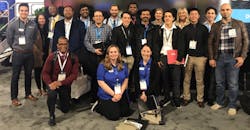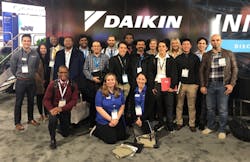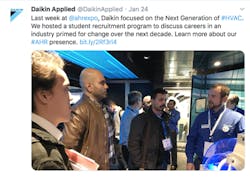NEXT GEN: Young Engineers Can Find Fulfillment in HVACR
By MIDORI DRAKE
Daikin Applied
Minneapolis MN
In 2010, as I was graduating from university with a degree in engineering, the job market was very different to what many engineering graduates are facing today. Throughout my undergraduate studies, I prepared myself for an entry-level position in civil engineering. When I graduated, the economic situation meant there were limited job openings, so I started my professional career as a flight attendant while continuing my search for an engineering role with a manufacturing company.
Big opportunities for young professionals
I soon came across an entry-level engineering opportunity at Daikin Applied. I knew the name Daikin, so I applied, and was thrilled when one of the top HVAC manufacturers offered me an entry level engineering position. I started my career with Daikin in the Applied Development Center just outside Minneapolis, Minnesota, working on the aero team. In this role, I became acquainted with Daikin Applied’s commercial portfolio and HVAC technology by working in the lab and testing various products. Now I contribute to the design of impellers and other aero components within the compressor of a chiller. As part of the manufacturing process, I routinely work with multiple engineering teams to make sure the aero design works with other components in the compressor and chiller, and that the final product meets mechanical and market requirements.
I started my career passionate about engineering, but I did not know much about the HVAC industry or career opportunities in manufacturing. Thanks to the training process at Daikin and support from my colleagues, I got up to speed quickly on the intricacies of HVAC product development. Entry-level training helped me not only learn the responsibilities I had in the development of new products or new product capabilities, but also the overall product lifecycle process and the important role I played in it. Having been with Daikin Applied for five years now, I can clearly see a fruitful long-term career ahead of me, and I want to encourage engineers who are finishing degrees, or looking for their next challenge, to consider manufacturing or HVAC.
Major technology companies are doing an impeccable job recruiting emerging talent to their ranks, and I think the manufacturing industry could learn some important lessons from these companies, when it comes to recruitment. That said, the opportunities at a manufacturer like Daikin are just as enticing as what you will find in Silicon Valley. Much like technology companies, manufacturers are beginning to undergo digital transformation, and my experience has proven that even as a young professional, engineers in HVAC have significant opportunity to shape the trajectory of project design as digital process and procedures take over. Working for a manufacturing company that is leading the way in technological innovation is exciting, and there is nothing more rewarding than seeing how my hard work results in a brand new product or service coming to life.
Manufacturers need talented engineers
Not only is this career path rewarding, the manufacturing industry is teeming with job openings and opportunities for engineers and other skilled workers, right now. This is the time for young people and passionate engineers to play a crucial role in shaping the future of HVAC and manufacturing, because today, there are 12.8 million jobs, and over 500,000 vacancies.
Businesses and manufacturing industries need to find a better way to raise awareness about the rich, rewarding career paths available. My entry-level training experience showed me that my opinion was important and the hands-on role I play in the overall process has helped me learn quickly. If we can show young people how their opinions literally come to market, perhaps we can start filling vacancies in the industry.
Technology will rule the future
The truth is, technology plays a vital role in manufacturing, and similar to working for a high-tech company, manufacturing engineers find and test product efficiencies, develop new software, build new products, work to find applications for A.I., apply machine learning, and put it all in the cloud.
This wide spectrum of responsibility means there are multiple fields of engineering to explore. It also means engineers will not be siloed into a role responsible for developing one thing and one thing only. Having accountability for an entirely new product is not uncommon, and seeing that product go to market is rewarding.
A study by Deloitte and The Manufacturing Institute estimates that over the next decade, 2.2 million manufacturing jobs will be left open due to the veteran workforce retiring and a lack of talent to fill it.
It is up to manufacturers to show graduates what they have to offer, and provide the next generation with learning and apprenticeship programs. Programs that give undergraduates the opportunity to work on real-life engineering projects over the summer, or allow entry-level candidates to rotate between different disciplines and learn new skills on the job. Programs like these should be the backbone of any recruitment drive, as well as transparency in the level of innovation and creativity that comes with a career
in manufacturing.
Without knowing the opportunities and various career paths the HVAC industry holds, I may not have considered applying for a job within it. However, I now feel lucky to have pursued the opportunity, and to have gained such great experience in such a short period of time. When attending recruitment fairs, I would encourage engineering undergraduates to stop by the manufacturing booths to try and gain this insight, and perhaps take advantage of introductory programs to see to how it fits.
The author works in Daikin’s Applied Development Center as a development engineer where she designs and optimizes impellers and aero components for compressors within its chillers. Midori earned her bachelor’s in civil engineering from University of Minnesota and began her career at Daikin in 2015. Her favorite part about Daikin is working with engineers from Japan, China, and Europe each day to find ways to meet the demands for newer, more environmentally friendly products.



